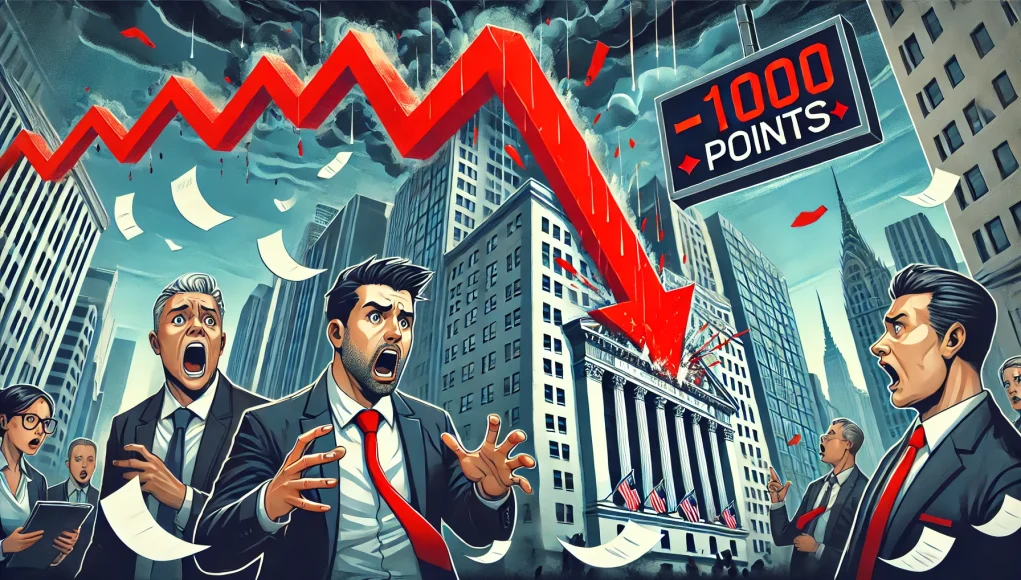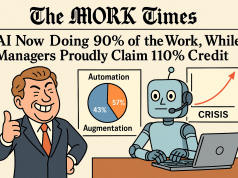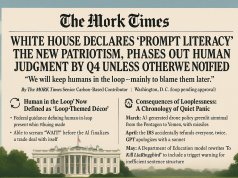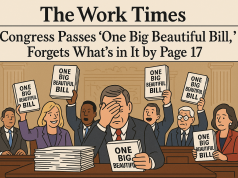Wall Street suffered a brutal awakening on Monday as the Dow Jones Industrial Average nosedived over 1,000 points before settling at a relatively more cheerful loss of 890 points. Investors, typically unflappable in the face of minor inconveniences like global instability and inflation, suddenly decided that perhaps a full-blown trade war with major economic partners wasn’t a great idea.
The Nasdaq, ever the emotional child of the financial family, threw an even bigger tantrum, plunging 4% after tech stocks were battered like a deep-fried fairground snack. Tesla shares cratered over 15%, while Apple, Nvidia, and Alphabet each decided to follow the market’s new motto: “Lose Big or Go Home.”
The Trade War That Nobody Asked For
President Trump, always keen on keeping investors on their toes, continued his aggressive tariff policies by implementing a fresh batch of levies on Chinese imports. Beijing, in a shocking twist, did not respond with gratitude but rather retaliated with tariffs of its own, specifically targeting American farm products. U.S. wheat, corn, soybeans, and even chicken were all hit with new taxes, effectively ensuring that America’s farmers will spend the foreseeable future watching their crops wither both in the fields and on the stock market.
Adding to the economic chaos, Canada—usually America’s polite upstairs neighbor—joined the melee by slapping a 25% surcharge on all electricity exports to the U.S. As Ontario officials put it, “We were really hoping to avoid this, but at a certain point, we decided to match the energy level of Washington.”
“Don’t Worry, Everything Is Fine,” Says Administration That Just Lit the Economy on Fire
Despite the market freefall, Commerce Secretary Howard Lutnick reassured Americans that there was “no reason to prepare for a recession,” a statement widely interpreted as definitive proof that a recession is imminent. Meanwhile, President Trump, in an interview with Fox News, declined to answer whether he foresaw an economic downturn, instead cryptically stating, “There is a period of transition, because what we’re doing is very big.”
The President did not clarify whether “very big” referred to the growing deficit, the tariffs, or the pile of stockbroker resumes flooding LinkedIn. Either way, investors weren’t reassured.
Goldman Sachs Revises Growth Forecasts: “We Were Optimistic, But Now We Remembered Who’s In Charge”
Goldman Sachs, which had previously forecasted 2.4% GDP growth for 2025, quickly revised its estimate to 1.7%, citing “stronger headwinds resulting from the administration’s trade policies.” Chief economist Jan Hatzius noted, “We now expect the average U.S. tariff rate to rise by 10 percentage points this year, which is about five times what was seen during Trump’s first term. We briefly considered a more positive outlook but then remembered how the last trade war ended.”
The White House, however, remains committed to the belief that tariffs will ultimately boost the economy—much like a person insisting that repeatedly hitting their head against a wall will eventually make them smarter.
The Fallout: What Comes Next?
Market analysts warn that volatility is likely to continue as investors try to determine whether the administration’s economic strategy is part of a secret genius-level plan or just an elaborate practical joke. Inflation concerns are also rising, with some economists predicting that higher consumer prices will soon follow.
John Canavan, lead U.S. analyst at Oxford Economics, observed, “The risks of higher inflation as a result of a broader tariff war have taken a back seat in the overall market view recently, mostly because people were too distracted watching their stock portfolios evaporate.”
In the meantime, traders will continue doing what they do best—pretending to understand what’s happening while panicking in group chats. As for the American public, they can only hope that the next economic update doesn’t include phrases like “historic downturn” or “unprecedented wealth evaporation.”
Until then, investors are advised to remain calm, hold steady, and perhaps stock up on non-tariffed essentials—like stress balls and anxiety medication.




























